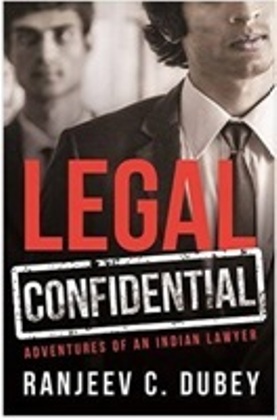Review in Associated News Services: Book Review: Legal Confidential-Adventures of an Indian lawyerJan 16, 2:32 pmBy Jaibans Singh New Delhi, Jan.16 (ANI): "Legal Confidential-Adventures of an Indian lawyer," a book written by Ranjeev C Dubey, a professional lawyer and practitioner, comes across as a no holds barred, brutally honest, almost confessional rendition about his journey in the legal profession. Dubey narrates his journey from the lowest rung of the trial courts, describing what goes on there - the scams and the scandals. He honestly acknowledges the apathy of the system to the problems of the citizens. He then goes on to describe his stint as an underdog in a law firm. He tells us about working conditions in these much admired institutions, and the cynical manipulations of those who run them. Lawyers in general have a lofty opinion of their profession's contribution to civilisation. More often than not, they possess an obvious air of superiority, barring a few exceptions of course. Dubey's talent at self-deprecation and self-mockery is a refreshing departure from the righteousness of lawyer literature. For this reason alone, the book must be read. The reality is that the average person fighting a case in court is traumatised by legal proceedings. He is subject to petty corruption and extortion in a process that is unending. How do we resolve the clear conflict between what the litigant experiences and what the lawyers pretend is the reality of Indian courts? The message that permeates from the book points to the need to address such issues more by introspection than through any structured intellectual discourse. The book is outrageously funny, and part of the fun of reading it, is the wildly twisted turn of phrase that you know is waiting for you round the corner of the next paragraph. The author has a unique worldview, and a crazy tangential way of looking at the world. This makes the book very easy to read. The manner in which the author explores the central ethical dilemmas confronting us as a society is profound, to say the least. He questions the meaning of justice in a democracy. He explores the contradictions of lawyer ethics in a system where everyone is entitled to legal representations. He discusses the things he has had to do out of professional compulsion in a world where winning is everything and truth only an unnecessary inconveniences. Beneath the surface of the author's flippant, frequently hilarious, descriptions is a clear understanding of the fundamental philosophical issues he has not successfully resolved. The book works because you can read it at many levels. It is an insider story book of revelations if you are looking for the truth about the much misunderstood profession of law. It is an entertaining story about what lawyers actually do at work if you that is what you are looking for. It is a book full of professional advice for a young lawyer struggling to make his mark. It is, in a manner, a cynical confessional with talk of moral compromise that many would be shy of expressing. On the flip side comes the author's proclivity to sensationalize and titillate? Lawyers are humans like those in every other profession: why would readers want to hear about lawyer sex as if it was something different from what other human beings experience. And how does all this knowledge enhance the central purpose of the book, which is to tell us about lawyers and the legal world? Dubey has written a rare and insightful book about a profession about which honest literature is lacking. The book should be in the library of every law college in India. It is good reading even for a layman with an interest in the real world of courts. The reader may be outraged, even upset, but in reading it, he will never be bored. (ANI)
|
